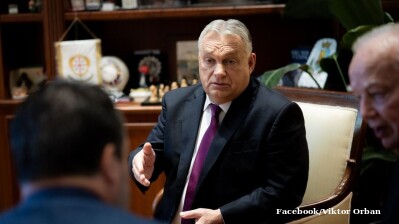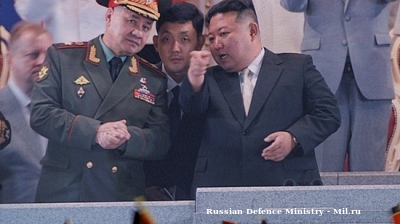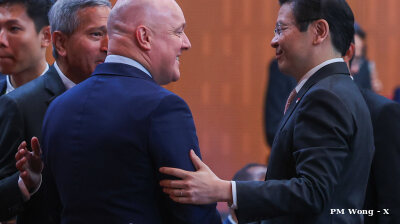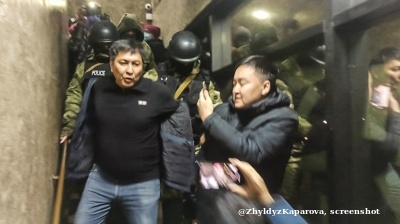The opposition Vetevendosje party scored a resounding victory in Kosovo’s snap general election on February 14, taking just over 48% of the vote according to preliminary results from the Central Election Commission (CEC).
This puts the party close to a majority in the parliament, though despite being the clear winner Vetevendosje will still need a partner to form a government and have a majority of at least 61 MPs in the parliament.
“An election turned into referendum and victory,” Kurti tweeted in the early hours of February 15. “Tonight our hearts are full of hope and our sights are set a little higher. We proved that there is nothing we cannot accomplish when we come together and walk firm. Thank you all for making this possible.”
The support for Vetevendosje was strong even though Kurti and two other party members were banned from participating in the election as they were convicted in 2018 for tear gas attacks in the parliament. By law, people who have been sentenced for a crime in the last three years are banned from running in elections.
The central election commission said that the election turnout was 46%. Over 1.79mn people were eligible to vote for 28 political entities and 1,079 candidates.
The US embassy in Kosovo reacted in a tweet saying that it is “encouraging to see so many citizens turn out to peacefully vote today, despite the weather & pandemic”.
Kurti’s strong stance against corruption has resonated with Kosovan voters disillusioned with the parties that have dominated the country’s politics since it declared independence in 2008, many of them headed by former commanders of the Kosovo Liberation Army (KLA), the guerrilla army that fought for independence from Yugoslavia.
2020 saw a break from the politics of the last 12 years as several top politicians – among them Kosovo’s then president Hashim Thaci and Democratic Party of Kosovo (PDK) leader Kadri Veseli – were indicted for war crimes and put into detention in The Hague while they await trial.
Meanwhile Vetevendosje, a left-wing nationalist party that grew out of a protest movement, has gained overwhelming popular support, especially from the younger generation of voters.
The preliminary results put the PDK in second place on 17% of the vote, followed by Vetevendosje’s coalition partner in Kurti’s short-lived 2020 government, the Democratic League of Kosovo (LDK) on 13% and former PM Ramush Haradinaj’s Alliance for the Future of Kosovo (AAK) on 7%.
20 seats are reserved for minorities' parties of which 10 are for ethnic Serbs. The Serb List (Srpska Lista) are expected to win all 10 seats.
In a speech on January 14, when he announced that Vetevendosje would run jointly with acting President Vjosa Osmani’s list, Kurti described the election as a referendum on Kosovo’s future. “We have made an agreement of political principles and goals … for a state with justice and without corruption, for a society with health, employment and education for all citizens, without distinctions, discrimination and favours,” the Vetevendosje leader said.
Along with its neighbours in the Western Balkans, Kosovo is one of the most corrupt countries in Europe, ranked 104th out of 180 countries and territories worldwide on Transparency International’s latest Corruption Perceptions Index. With its economy damaged by the coronavirus (COVID-19) pandemic last year, even before 2020 Kosovo struggled to attract international investment partly because of its long-unresolved dispute with Serbia. The lack of opportunities and high unemployment have led to large-scale emigration.
While all of the main political parties talk of alleviating poverty and raising living standards, Vetevendosje’s policies on the economy have been specific and coherent: it wants to raise taxes on higher income groups to fund investment and tackle poverty, it opposes privatisation and it wants to support domestic production including through subsidies for local companies. It is also adamantly against compromise with Serbia.
“LVV [Vetevendosje] has taken a stronger stance on Kosovo’s status than the other parties, which have all conceded the need to compromise with Serbia in order to gain recognition … A second factor is the decline of some of the established parties after their leaders were extradited to The Hague to stand trial for war crimes at the end of last year. This is particularly so for PDK and the Social Democratic Initiative (Nisma), which are largely vehicles for former president Hashim Thaci and Fatmir Limaj respectively,” Michael Taylor, senior analyst, Eastern Europe at Oxford Analytica, told bne IntelliNews.
“LVV’s strong stand against corruption and its programme stressing poverty eradication, raising the minimum wage, social housing, economic revival and jobs in a country where many, especially the young, are unemployed is going down well with voters. As a party which has spent most of its time in opposition, it is relatively untarnished by corruption.”
Vetevendosje was the winner in the last general election in October 2019, when it took 26.27% of the vote, less than two percentage points ahead of the second-ranked LDK, as voters expressed their frustration over the failure of previous governments to tackle poverty, unemployment and corruption. The two parties formed a coalition government that was voted in on February 3, 2020.
But less than two months after Kurti’s government was formed, rifts opened up between Vetevendosje and the LDK on critical issues such as the 100% tariffs on imports from Serbia and Bosnia & Herzegovina and the handling of the coronavirus pandemic. Kurti sacked interior minister Agim Veliu, one of the LDK’s ministerial appointments, when Veliu backed calls from Thaci to declare a state of emergency, prompting the LDK to call a confidence vote in the government.
After the vote, Kurti accused then US president Donald Trump’s envoy for the Western Balkans, Richard Grenell, of being “directly involved” in bringing down his government. Kurti argued at a press conference that Grenell saw him as an obstacle to the deal with Serbia that the White House wanted ahead of the US’ autumn presidential election.
The next government, led by the LDK’s Avdullah Hoti, didn’t last much longer, as the Constitutional Court ruled in December that the vote to appoint Hoti’s cabinet had been invalid, thus prompting the snap election – the fifth since Kosovo gained independence in 2008.
On the contrary, the controversy surrounding the Trump administration’s suspected interference in Kosovo’s domestic policies contributed to the groundswell of support that has seen the share of voters favouring Vetevendosje in recent polls reach almost double the share he received in October 2019. The suggestion that Kurti was victim to what effectively amounts to a coup by Washington left its legacy, says Adem Ferizaj, graduate teaching assistant at Soas University of London, “it especially led to a further politicisation changing the political awareness of a major part of the society.”
From street protests to parliament
Both Kurti and Vetevedosje have come a very long way since the early days of independence. When the Kosovan war broke out in 1998 Kurti was a student at the University of Pristina, where he organised protests against the Yugoslav police’s occupation of the campus that were brutally put down. Like other leading politicians such as Thaci, Veseli and Haradinaj, Kurti was a member of the KLA, working for its political representative Adem Demaci. During the Nato bombing of Yugoslavia in 1999, Kurti was arrested and beaten, then sentenced to 15 years in prison. His release was secured under international pressure after the fall of Slobodan Milosevic’s regime in Belgrade.
Yet while other Kosovan politicians went on to enjoy a cosy relationship with the representatives of the international community in the country – the United Nations Interim Administration Mission in Kosovo (UNMIK) and the European Union Rule of Law Mission in Kosovo (EULEX) – Kurti has campaigned vigorously against them.
Vetevendosje – the party name means “self-determination” in Albanian – grew out of the Kosova Action Network (KAN), which also promoted human rights and social justice. Kurti was among hundreds of activists arrested and convicted during protests in 2005, the year Vetevendosje was founded, when they wrote "No negotiations, Self-Determination" on UNMIK buildings.
Vetevendosje clashed again with the UN presence in Kosovo in February 2007, when it organised a protest against the Ahtisaari Plan, a proposed settlement agreement for Kosovo, that turned violent. Romanian UN police officers killed two protesters and injured 80 others. Kurti was arrested again and sentenced.
Initially outside mainstream party politics, Vetevendosje entered parliament for the first time in 2010, slightly increasing its share of the vote in 2014, and almost doubling it to become the largest party in the parliament after the 2017 and 2019 elections. Even after entering parliament Vetevendosje remained a rebel force; Kurti and other MPs repeatedly let off smoke bombs in the assembly in protest against an agreement with Belgrade giving limited autonomy to Serbs in northern Kosovo in autumn 2015. They used the same tactic in 2018, when MPs met to vote on a border demarcation deal with Montenegro.
At a time when many of the parties and movements that have challenged the political establishment are from the populist right, Vetevendosje is a relatively rare example in the Central and Eastern Europe (CEE) region of a left-wing popular movement that has managed to gain mass appeal. The challengers to the entrenched local elites in other Western Balkans have mainly been from the far right, such as the parties that co-opted protests against President Aleksandar Vucic in Serbia last summer and some members of the new government in Montenegro that successfully ousted President Milo Djukanovic’s Democratic Party of Socialists after 30 years in power. Another emerging right-wing force is the Alliance for the Unity of Romanians (AUR) that took a startlingly high 9% of the vote in Romania’s December general election barely a year after it was founded.
Yet the last decade has also seen left-wing anti-establishment movements shift from the fringes to the mainstream, not only Vetevendosje, but also Syrzia, which took power in Greece, as well as Spain’s Podemos, which grew out of mass protests against inequality and corruption to become one of the country’s largest parties and a member of the current government.
A new era in Kosovo
Vetevendosje’s convincing poll victory puts it in a far stronger position than after the last general election, giving it the scope to pursue its policy agenda and make good on pledges like tackling corruption.
“The main change will be an attempt to reduce corruption and criminality, the main theme of LVV’s election campaign. There is certainly room for overhauling a political, economic, judicial and social system based on bribery and nepotism rather than the rule of law,” says Taylor. “In the past, LVV has also emphasised the need to cut bureaucracy, free up the market, empower the state to intervene more forcefully in the economy and nurture a ‘social state’ with an emphasis on equality, education, health and the environment.”
A dramatic change can also be expected in the approach towards Serbia. Previous governments have worked – albeit sporadically – towards the normalisation of relations with Belgrade, as the only way for both states to move towards EU accession. Over the years there have been repeated meetings between Thaci (who favoured a land swap as a way to end the conflict) and Vucic, and these continued between Vucic and Hoti after Thaci’s resignation. Kurti, by contrast, has consistently taken a tougher line on Serbia, and insists on the principle of reciprocity.
“The dialogue has not been a priority topic in the pre-election campaign. However, it is clear that Vetevendosje’s approach to the dialogue with Serbia drastically changes from the approach shown by previous Kosovo-Albanian politicians. In its first government, Vetevendosje insisted that the dialogue with Serbia had to be a principled one, especially relying on the principle of reciprocity,” says Ferizaj.
“An LVV victory would probably end any prospect of a deal with Serbia, since it refuses to make any concessions to Belgrade,” says Taylor. “[I]t is more likely that an LVV-led government will pursue unification with Albania as the means to ending Kosovo’s state of legal limbo rather than trying to gain recognition by means of an unsatisfactory compromise with Serbia. Unification has been touted by Albanians in both countries as their fall-back position if EU accession ambitions are not fulfilled.”
News

European diplomacy should have stopped war, Orban tells Italian broadcaster
The job of European diplomacy would have been stopping the war in Ukraine, but Brussels has become "irrelevant" by deciding not to negotiate, Prime Minister Viktor Orban told an Italian TV channel on October 28.

North Korea fires cruise missiles to mark Trump's arrival in the South
State media framed the launch as a reminder of North Korea’s military strength to what it described as its enemies. The launch does not breach United Nations restrictions, since the rules prohibit ballistic missile testing, not cruise missiles.

Singapore PM Lawrence Wong heads to APEC in bid to deepen Seoul ties
The visit will be Wong’s first trip to South Korea since he assumed office in May 2024, and the first by a Singaporean prime minister since 2019 – in part to recognise the 50th anniversary of diplomatic relations between the two nations.

US–South Korea investment deal on ice – for now
After a triumphant round of investment pledges in Tokyo, Donald Trump’s state visit to South Korea presents a far more challenging negotiation.




